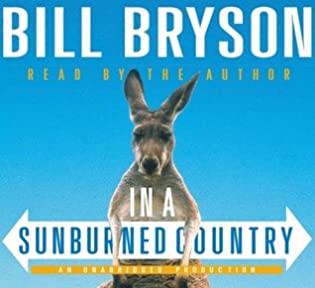 In a Sunburned Country by Bill Bryson
In a Sunburned Country by Bill Bryson Narrator: Bill Bryson
Published by Random House on January 4, 2000
Genres: Nonfiction, Travel
Length: 11 hours 54 minutes
Format: Audio, Audiobook
Source: Library
Buy on Amazon
Goodreads

Every time Bill Bryson walks out the door, memorable travel literature threatens to break out. His previous excursion along the Appalachian Trail resulted in the sublime national bestseller A Walk in the Woods. In A Sunburned Country is his report on what he found in an entirely different place: Australia, the country that doubles as a continent, and a place with the friendliest inhabitants, the hottest, driest weather, and the most peculiar and lethal wildlife to be found on the planet. The result is a deliciously funny, fact-filled, and adventurous performance by a writer who combines humor, wonder, and unflagging curiosity.
Despite the fact that Australia harbors more things that can kill you in extremely nasty ways than anywhere else, including sharks, crocodiles, snakes, even riptides and deserts, Bill Bryson adores the place, and he takes his readers on a rollicking ride far beyond that beaten tourist path. Wherever he goes he finds Australians who are cheerful, extroverted, and unfailingly obliging, and these beaming products of land with clean, safe cities, cold beer, and constant sunshine fill the pages of this wonderful book. Australia is an immense and fortunate land, and it has found in Bill Bryson its perfect guide.
After an aborted attempt at reading The Narrow Road to the Deep North* by Richard Flanagan for the Book Voyage Challenge (a book set in Australia or New Zealand), I decided to check this title out from the library. I had previously read Bryson’s book The Mother Tongue with mixed results, but I had heard this book was pretty good, and it was. I learned a lot about Australian history and natural science, none of which I knew. Bryson makes the point that we forget about Australia, and I think it’s a valid point.
I found his chapters on the indigenous population to be most interesting. Is there a place in the world where an indigenous population has been treated with a modicum of respect? I’m sincerely asking. What happened to Australia’s Aboriginal population is very similar to what happened to the indigenous population in the United States.
I was also fascinated by Bryson’s description of Australia’s natural features and wildlife. I’m not sure if he has convinced me to visit Australia or steer clear! Of course, Bryson’s characteristic wit makes for a fun read. It made me want to read more of his books, especially those that deal a bit with travel (I checked A Walk in the Woods out from my library). Bryson makes an effort to see as much of Australia as he can—even places that it sounds like many Australians don’t necessarily see. He has a deep curiosity and a wonderful way of drawing the reader into that curiosity.
Bryson narrates this audiobook, and he is a good narrator—many writers are not necessarily good at reading their work. If you do read it, I recommend the audiobook with the caveat that you might find you want to look up some of the text. It was a much more enjoyable read than I was expecting. My only concern is that at times, Bryson seems a bit glib. It was hard to read his concern for the Aboriginal population summed up like this:
If I were contacted by the Commonwealth of Australia to advise on Aboriginal issues, all I could write would be “Do more. Try harder. Start now.”
So without an original or helpful thought in my head, I just sat for some minutes and watched these poor disconnected people shuffle past. Then I did what most white Australians do. I read my newspaper and drank my coffee and didn’t see them anymore.
No one is asking Bryson to solve a problem that is centuries in the making. Obviously, no one person can resolve systemic racism alone, especially as a visitor to another country, but deciding not to see it is remaining complicit. This book is now about 20 years old, and I wonder if Bryson would write that last sentence again if he wrote this book now (not that we can excuse him for writing it then). I am glad he spent some pages discussing Aboriginal issues and history, but this book is not the book to really learn about Australia’s indigenous population. Bryson’s curiosity only went so far.
Where he shines is in his self-deprecating description of his traveling fiascos (not being able to find a room, staying in bad hotels, getting an egregious sunburn, freaking out over the local fauna). As long as he keeps it light, this is a fun read. Bryson’s gift is making the reader feel like they’re traveling right along with him, and this was a pretty good trip.
*I was really hating this book. I disliked every single character, and the story was not grabbing me. I feel a little bad since the author was basing it on his father’s experiences in World War II, but there it is.